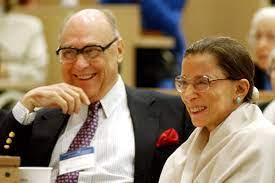Ruth Bader Ginsburg Net Worth: A Legacy Beyond Wealth
Introduction
Ruth Bader Ginsburg was an iconic figure in American history, renowned for her tireless advocacy of women’s rights and her contributions to the field of law. Throughout her impressive career, Ginsburg achieved significant milestones, becoming the second woman to serve on the U.S. Supreme Court and leaving an indelible impact on the nation’s legal landscape. While her influence extends far beyond monetary worth, exploring Ruth Bader Ginsburg’s net worth provides insight into her achievements and the broader impact she made during her lifetime.
Early Life and Education
Born on March 15, 1933, in Brooklyn, New York, Ruth Bader Ginsburg (née Joan Ruth Bader) grew up in a working-class neighborhood, where she developed a passion for justice and equality from an early age. Ginsburg’s academic prowess became evident as she excelled in her studies, eventually earning a full scholarship to Cornell University. After graduating Phi Beta Kappa from Cornell in 1954, she married Martin D. Ginsburg and began her legal education at Harvard Law School. Despite facing significant gender-based discrimination, Ginsburg transferred to Columbia Law School, where she graduated at the top of her class in 1959.
Legal Career and Advocacy
Following her graduation from Columbia Law School, Ginsburg embarked on a remarkable legal career characterized by her commitment to advocating for gender equality. After working as a clerk for Judge Edmund L. Palmieri, she joined the American Civil Liberties Union (ACLU) as a volunteer attorney. Ginsburg played a pivotal role in several landmark cases, arguing before the Supreme Court and successfully challenging discriminatory laws that perpetuated gender-based inequalities. Notable among these cases was Reed v. Reed (1971), where she convinced the court that the Equal Protection Clause of the Fourteenth Amendment prohibited gender-based discrimination.
Appointment to the Supreme Court
Ruth Bader Ginsburg’s reputation as a brilliant jurist and her unwavering dedication to equal rights garnered significant attention. In 1980, President Jimmy Carter appointed her to the U.S. Court of Appeals for the District of Columbia Circuit. Ginsburg served on the court for thirteen years, gaining a reputation as a moderate liberal and earning the respect of her peers.
In 1993, President Bill Clinton nominated Ginsburg to fill the vacant seat on the U.S. Supreme Court, left by Justice Byron White. Her confirmation hearings were relatively smooth, and she was approved by the Senate with an overwhelming majority. Ginsburg’s appointment made her the second woman in history to serve on the nation’s highest court, following in the footsteps of Justice Sandra Day O’Connor.
Supreme Court Legacy and Influence
During her 27 years on the Supreme Court, Justice Ginsburg made significant contributions to the development of American law. Her opinions and dissents demonstrated her unwavering commitment to civil rights, women’s rights, and social justice. Ginsburg became known for her eloquent and powerful written opinions, which often highlighted the need for progress in society and called attention to the injustices faced by marginalized communities.
Notable cases in which Ginsburg played a pivotal role include United States v. Virginia (1996), where she wrote the majority opinion holding that the Virginia Military Institute’s male-only admission policy violated the Equal Protection Clause, and Obergefell v. Hodges (2015), where she joined the majority in recognizing same-sex marriage as a constitutional right.
Apart from her judicial contributions, Ginsburg’s influence extended beyond the courtroom. She became a cultural icon, earning the nickname “Notorious RBG,” which celebrated her tenacity, intellect, and her refusal to back down in the face of adversity. Her powerful dissenting opinions gained widespread attention, inspiring a new generation of activists and jurists.
Net Worth and Philanthropy
While Ruth Bader Ginsburg’s net worth at the time of her passing in September 2020 was estimated to be around $4 million, her legacy and impact on American society are immeasurable. It’s important to note that her net worth was relatively modest compared to other public figures, reflecting her lifelong commitment to public service rather than personal wealth accumulation.
Throughout her career, Ginsburg consistently emphasized the importance of equal rights and social justice. She used her platform to advocate for the advancement of women’s rights, LGBTQ+ rights, and racial equality. Ginsburg’s philanthropic efforts included supporting organizations dedicated to these causes, such as the ACLU and the Women’s Rights Project.
Conclusion
Ruth Bader Ginsburg’s net worth may have been modest, but her contributions to the advancement of justice and equality were extraordinary. Her legacy as a trailblazing jurist, advocate for women’s rights, and champion of equality will continue to inspire generations to come. Ginsburg’s impact on American law and society extends far beyond monetary measures, serving as a testament to her remarkable intellect, courage, and unwavering commitment to fairness and justice.
|
Read Also: Biography
|
|
Follow at: Instagram
|












